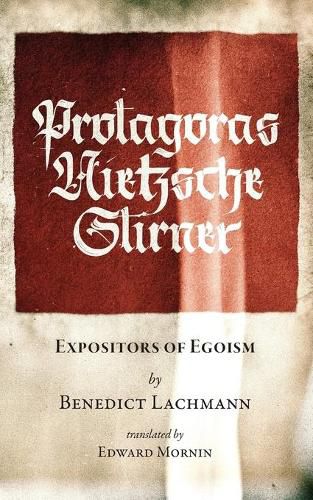Readings Newsletter
Become a Readings Member to make your shopping experience even easier.
Sign in or sign up for free!
You’re not far away from qualifying for FREE standard shipping within Australia
You’ve qualified for FREE standard shipping within Australia
The cart is loading…






Lachmann’s essay Protagoras. Nietzsche. Stirner. traces the development of relativist thinking as exemplified in the three philosophers of its title. Protagoras is the originator of relativism with his dictum Man (the individual) is the measure of all things . This in turn is taken up by Stirner and Nietzsche. Of the two, however, Stirner is by far the most consistent and for this reason Lachmann places him after Nietzsche in his account. For him Stirner surpasses Nietzsche by bringing Protagorean relativism to its logical conclusion in conscious egoism-the fulfilment of one’s own will.
In fact, he views Nietzsche as markedly inferior to Stirner both in respect to his style and the clarity of his thinking. In contrast to Nietzsche’s work, he writes, The Ego And Its Own is written in a clear, precise form and language, though it avoids the pitfalls of a dry academic style. Its sharpness, clarity and passion make the book truly shattering and overwhelming. Unlike Nietzsche’s, Stirner’s philosophy does not lead to the replacement of one religious spook by another, the substitution of the Superman for the Christian God . On the contrary, it makes the individual’s interests the centre of the world.
Intelligent, lucid and well-conceived, Lachmann’s essay throws new light on Stirner’s ideas.
$9.00 standard shipping within Australia
FREE standard shipping within Australia for orders over $100.00
Express & International shipping calculated at checkout
Lachmann’s essay Protagoras. Nietzsche. Stirner. traces the development of relativist thinking as exemplified in the three philosophers of its title. Protagoras is the originator of relativism with his dictum Man (the individual) is the measure of all things . This in turn is taken up by Stirner and Nietzsche. Of the two, however, Stirner is by far the most consistent and for this reason Lachmann places him after Nietzsche in his account. For him Stirner surpasses Nietzsche by bringing Protagorean relativism to its logical conclusion in conscious egoism-the fulfilment of one’s own will.
In fact, he views Nietzsche as markedly inferior to Stirner both in respect to his style and the clarity of his thinking. In contrast to Nietzsche’s work, he writes, The Ego And Its Own is written in a clear, precise form and language, though it avoids the pitfalls of a dry academic style. Its sharpness, clarity and passion make the book truly shattering and overwhelming. Unlike Nietzsche’s, Stirner’s philosophy does not lead to the replacement of one religious spook by another, the substitution of the Superman for the Christian God . On the contrary, it makes the individual’s interests the centre of the world.
Intelligent, lucid and well-conceived, Lachmann’s essay throws new light on Stirner’s ideas.